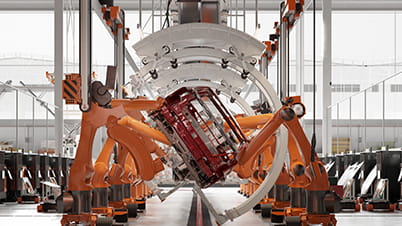Mobile guests are changing the experience game in hospitality.
And continuous engagement can help you stay unique in a tough market. Let’s see some examples of how other hotels organized their operations to welcome - and serve - this mobile fleet of guests in a timely manner.
1. With hotel staff mobility
Staff mobility isn't always top of mind for hospitality industry professionals, as one of our recent hospitality digital transformation surveys show, but that will change in the near future, as hoteliers realize that staff efficiency heavily impacts the guest experience.
Dedicated mobile devices (DECTs or wireless handsets for example) have helped many hotels provide faster service. One example is the Buddha-Bar Hotel in Paris: “Mobility really brought efficiency to our teams, allowing them to be available at any time and therefore rapidly answer our customers’ needs. Today, everyone from the concierge to the maid can connect and share information in real time.” said Mr. Le Berre, General Manager at the time.
Other hotels prefer allowing employees to use their own mobile devices, which reduces hardware to one device and also reduces maintenance costs. The Winn Hotel in Sweden uses a mobile app on employee devices that allows them to communicate room availability to the front office.
2. Thanks to consistent service quality across all channels
Today’s guests interact with hotels in many different ways: From their mobile devices, via social media, the hotel web site, by chat. A consistent quality of service across all different teams (front office, reservation centers, mobile teams) and media is a key differentiator. “The one thing that sets us apart is customer service,” says the Shangri-La Hotels and Resorts Customer Service Director. “ALE helped us really engage with our customers in the best possible way at all times and provide them service and assistance right away.”
3. Via an efficient workflow
Hotel operations can communicate simply and effectively by using a simple app. For example, cleaning employees can communicate via a code on the room phone that the room is ready, instead of calling the reception every time. They can also do it via a mobile app, like the Winn Hotel employees do. “They can update the bookings as soon as the rooms are done. They tap a code on their mobile phones and inform (the front desk) that the room is ready to be sold.”
4. With rapid emergency management
Many hotels have complex and non-integrated emergency systems or processes. Beverly Hills Hotel in California, for example, had a striker system. When an emergency call was placed, it would print on a small printer in the operator office, who would have to radio security. “We had an issue with the time to response of every 911 call.” says Adam Jones, IT Director of the Dorchester Collection in California. Moving to a centralized application greatly helped shorten the time it took to react, addressing emergency standards and ensure guest safety. “Both the security directors at Hotel Bel-Air and Beverly Hills Hotel, really enjoyed seeing the reaction and the accountability that was provided to them when they accessed the different reporting tools of the Emergency Notification admin console.” Integrated, centralized systems also allow hotels to notify all room and mobile guest devices at once.
Ready to go one step further? Learn how other hotels have integrated operations and deliver rapid service. Learn more how you can make hotel operations more efficient!
Latest Blogs

Empowering businesses through choice: Why your cloud operat…
A flexible cloud operating model gives businesses the freedom to choose, communicate better, serve smarter, defend stronger, and grow bigger.

The SaaS Advantage for Hotels and Hospitality Communication…
Modern hospitality communications platforms deliver flexibility, cost optimization and exceptional guest experiences.

Your Communications System: A Brake or an Accelerator?
A modernized platform empowers enterprises to optimize operations and drive continuous performance.

Smart Manufacturing Solutions: The Future of Connected Fact…
Smart manufacturing solutions enable connected factories through reliable, intelligent network connectivity that powers automation and efficiency.





